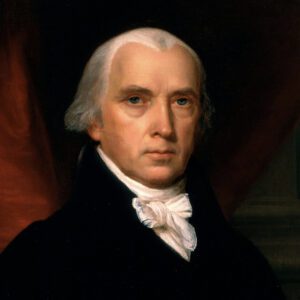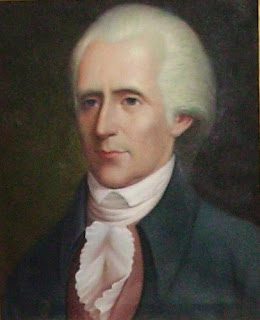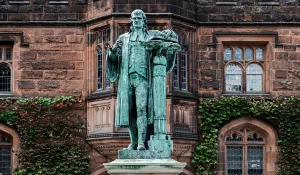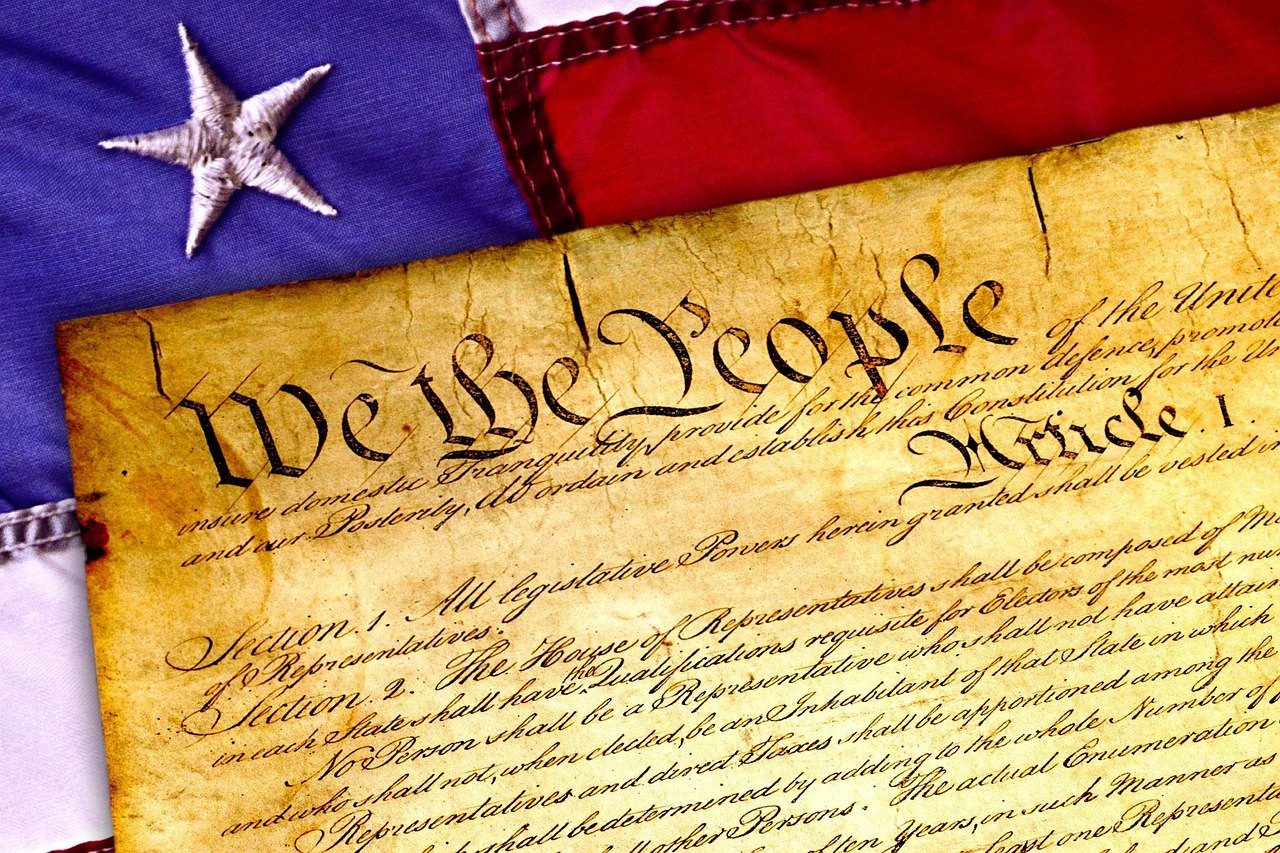
Reverend John Witherspoon brought impressive academic credentials and public acclaim when he migrated from Scotland to the American colonies in 1768. He made this move to become president of the College of New Jersey (now Princeton University). He turned the college into a successful and prestigious institution, and he became quite popular. He published essays that at first were nonpolitical, but he came to support the American revolutionary cause. He was elected to the Continental Congress and signed the Declaration of Independence. He spent most of his later years rebuilding the college which had been destroyed by the British during the Revolutionary War.
(The College of New Jersey did not officially become Princeton University until 1896 but the two names were often used interchangeably. I follow that usage in this essay.)
John Witherspoon was born in Yester, Gilford, East Lothian, Scotland on 5 February 1723. He was the eldest child of the Reverend James Alexander Witherspoon and Anne Walker. James was the minister of Yester Parish and served on committees in the General Assembly and was Royal Chaplain to the Lord High Commissioner. Anna came from a long line of clergymen.
John’s mother was his first teacher and she taught him to read by the age of four. He attended the Haddington Grammar School and when he was 13, he was sent to the University of Edinburg. He completed the four-year program in three years earning a Master of Arts Degree. By the time he was 20, John had earned his Doctor of Theology Degree and a license to preach. He received his first parish, Beith, Ayrshire on 11 April 1745.
John Witherspoon was a dedicated Protestant, nationalist, and supporter of republicanism. He opposed the Roman Catholic Jacobite uprising of 1745-1746 when Charles Edward Stuart, who was trying to reclaim the English throne for his family, invaded. Witherspoon joined other men gathering to fight against the rebellion, but he was soon captured. Following the short-lived Jacobite victory at the Battle of Falkirk Muir, John endured a brief but brutal imprisonment at Doune Castle near Stirling. In April 1746, the English Army put down the uprising.

On 2 September 1748, John Witherspoon married Elizabeth Montgomery. She was the daughter of Robert Montgomery and Janet Cossar. Elizabeth had little education, but her “piety, generosity, and graciousness made her loved by all.” Elizabeth and John had 10 children with 5 surviving to adulthood.
In1758 Witherspoon became minister of Leigh Kirk, Paisley Parish. During his service as a parish minister, John became a prominent intellectual associated with the moral philosophy of the Scottish Enlightenment. He was an evangelical opponent of the Moderates, and he authored three well-known works on theology.
Reverend Witherspoon’s reputation had reached the American colonies. When the presidency of the College of New Jersey became vacant due to the death of Dr. Samuel Finley, the trustees voted to attempt to hire John Witherspoon. In 1766 a group was dispatched to Scotland to recruit him. The group included two individuals, Dr. Benjamin Rush, and Richard Stockton, that would later be signers of the Declaration of Independence.
Witherspoon initially declined their offer because his wife was fearful of sea travel. The charming Dr. Rush later met with Elizabeth and convinced her to reconsider. John Witherspoon and his family set sail for Philadelphia on the brigantine, “Peggy” on 18 May 1768. They arrived in August.

At the age of 45, John Witherspoon became the sixth president of the small Presbyterian College of New Jersey at Princeton. He inherited a school that was in debt, with weak instruction, and an inadequate library. He immediately began fund raising in America and Scotland. He donated 300 of his own books to the library and began purchasing scientific equipment.
The college thrived under Witherspoon. He instituted numerous academic reforms based on those at Scottish universities. He also strengthened entrance requirements which helped the school compete with Harvard and Yale for students.
Witherspoon personally taught many courses including divinity and moral philosophy. The latter course he believed was vital for ministers, lawyers, and public servants. He was a firm but good-humored leader and was quite popular among the faculty and students. He also became a major leader in the Presbyterian Church in America.

The college had been organized in 1746 to primarily train clergymen, but under Witherspoon’s leadership it became a more classical institution that would train many early American leaders. These included James Madison, Aaron Burr, Philip Freneau, William Bradford, and Hugh Henry Brackenridge. Under Witherspoon the college also produced 37 judges (three became Justices of the US Supreme Court), 10 cabinet officers, 12 members of the Continental Congress, 28 US Senators, and 49 US Congressmen. Educating American leaders has continued to this day.
The many essays that Witherspoon authored and published were initially non-political, but he soon became a supporter of the American revolutionary cause. By 1770 the students were openly advocating for independence and Witherspoon advocated for resistance to the Crown in a commencement address. As a Scotsman, he already distrusted the British monarchy and was concerned about the Crown’s increasing interference in colonial affairs, especially in the church.

Reverend Witherspoon had a country estate constructed in Princeton in 1773. He named the estate “Tusculum.” It was the Witherspoon’s family home until after John’s death. The house is still occupied today.
In 1774 John Witherspoon joined the New Jersey Committee of Correspondence and Safety, and he was elected to represent Mercer County in the New Jersey Provincial Assembly. While in the Assembly he successfully pushed for the removal and imprisonment of the Royal Governor.
The entire year of 1776 was quite eventful for Witherspoon. Early in the year he delivered a sermon entitled “The Dominion of Providence Over the Passions of Men.” This sermon was also published and widely disseminated.
The sermon was a theological discussion of God’s blessing of man’s endeavors. The text is long and was meant to apply to the American Revolution. Basically, Witherspoon concluded that if your cause was just and your people trusted in God, were pious and obedient, God would help.

Later in 1776 Witherspoon was elected to the Continental Congress. He was appointed Congressional Chaplain and in July he voted for Virginian Richard Henry Lee’s resolution for independence. He voted for and signed the Declaration of Independence. He was the only active clergyman among the signers.
British troops entered New Jersey in 1777 so John closed the College of New Jersey. However, the British occupied the college and burned much it, including the library. Many of his academic papers were also destroyed. That same year, his son James was killed in the Battle of Germantown, Pennsylvania.
Reverend Witherspoon became one of the most influential members of Congress and was a tireless workhorse. He served on over 100 committees and spoke on the floor often. He fought against the flood of paper money, which was being printed to pay for government, personal, and business expenses and was causing high inflation. He preferred the use of gold and silver. His influence on this issue can be seen in the US Constitution Article I, Clause 5 which states that American money was to be metal. He also helped draft and then signed the Articles of Confederation. John helped organize the executive departments of the new government.
Even though he was quite involved in Congress, when the British withdrew from Princeton, John was responsible for and worked on rebuilding the College of New Jersey. The rebuilding was under a deadline of November 1778 when classes were to resume. Rebuilding the college caused Witherspoon considerable personal and financial stress.
Witherspoon left the Congress in1782 with an outstanding reputation as a patriot, pastor, and educator. He was one of the most influential men in the nation, and he did not slow down. He served two terms in the New Jersey legislature and was instrumental in the New Jersey ratification of the US Constitution on 18 December 1787. New Jersey was the third state to ratify the Constitution, and they did it in six days.
Concurrently, Reverend Witherspoon was a major contributor to the organization of the newly independent and national Presbyterian Church. In 1789 he opened the Church’s first General Assembly with a sermon. He also presided over the assembly until a permanent moderator could be elected.
On 1 October 1789, Elizabeth Witherspoon died suddenly at Tusculum. Sadly, Elizabeth had never been completely content in America. She was buried in Princeton Cemetery. After her death John returned to the State Assembly.
In 1791 John Witherspoon married the 24-year-old widow Anne Marshall Dill. The couple had two children with one surviving only nine days.
A shipboard accident in 1784 had blinded Witherspoon in one eye, and later a fall from a horse injured the other eye. He was totally blind by 1792. His health deteriorated but he continued with his College of New Jersey duties with the assistance of his son-in-law, Samuel Stanhope Smith. (Smith was elected president of the college in May 1795.)

John Witherspoon died at Tusculum, on 15 November 1794. Three days later he was buried in Princeton Cemetery. There are many memorials to John Witherspoon, including four major statues: in Dupont Circle in Washington, DC; Presbyterian Historical Society in Philadelphia; University of West Scotland in Paisley, Scotland; and at Princeton. In 2022, Princeton students petitioned to remove the statue because Witherspoon had owned slaves. Several schools and streets that were named for him had his name removed for the same reason.
No matter the status of efforts to cancel his name, John Witherspoon was a true patriot and outstanding minister and educator. He should be honored for his contributions to the founding of the country, to the organization of the government, and for the development of Princeton into one of the most prestigious universities in the country. It is unfortunate and wrong to sully his reputation by judging him based on today’s moral beliefs by some.
